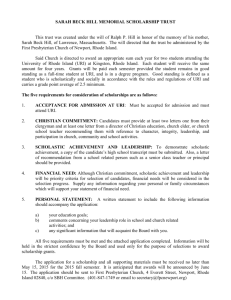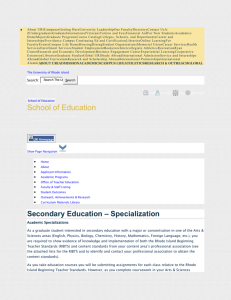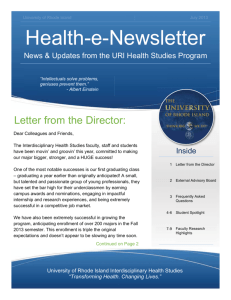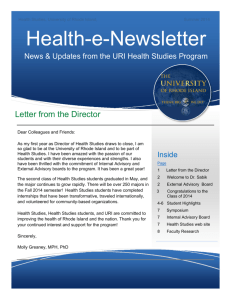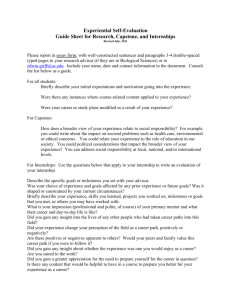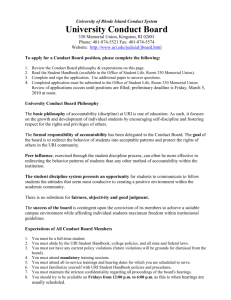Health-e-Newsletter - University of Rhode Island
advertisement
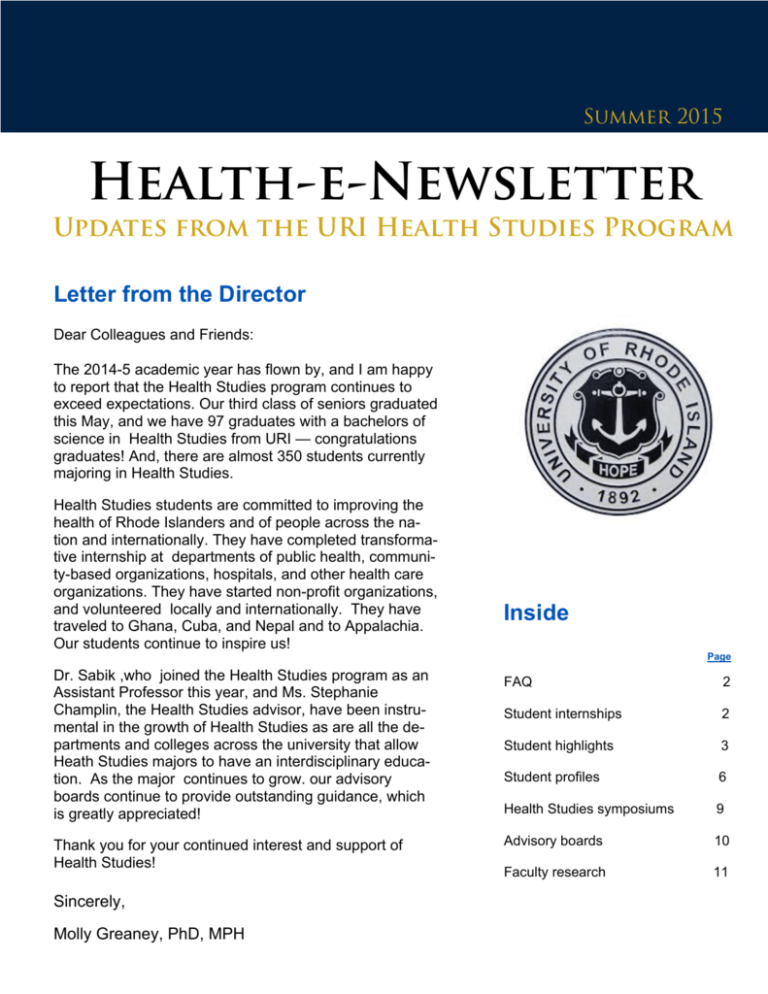
Summer 2015 Health-e-Newsletter Updates from the URI Health Studies Program Letter from the Director Dear Colleagues and Friends: The 2014-5 academic year has flown by, and I am happy to report that the Health Studies program continues to exceed expectations. Our third class of seniors graduated this May, and we have 97 graduates with a bachelors of science in Health Studies from URI — congratulations graduates! And, there are almost 350 students currently majoring in Health Studies. Health Studies students are committed to improving the health of Rhode Islanders and of people across the nation and internationally. They have completed transformative internship at departments of public health, community-based organizations, hospitals, and other health care organizations. They have started non-profit organizations, and volunteered locally and internationally. They have traveled to Ghana, Cuba, and Nepal and to Appalachia. Our students continue to inspire us! Inside Page Dr. Sabik ,who joined the Health Studies program as an Assistant Professor this year, and Ms. Stephanie Champlin, the Health Studies advisor, have been instrumental in the growth of Health Studies as are all the departments and colleges across the university that allow Heath Studies majors to have an interdisciplinary education. As the major continues to grow. our advisory boards continue to provide outstanding guidance, which is greatly appreciated! Thank you for your continued interest and support of Health Studies! Sincerely, Molly Greaney, PhD, MPH FAQ 2 Student internships 2 Student highlights 3 Student profiles 6 Health Studies symposiums 9 Advisory boards 10 Faculty research 11 Frequently Asked Questions What is health studies Health Studies is an interdisciplinary program designed to prepare students for non-clinical careers in public health, health education promotion, health services, and health-related research working in for-profit companies, hospitals and community health agencies, and not-for-profit organizations. What courses does the curriculum require? Students take courses in anatomy & physiology, statistics, ethics, and epidemiology, as well as two core Health Studies classes (HLT 200 and HLT 450), which focus on interdisciplinary research, professional writing and verbal communication. Students also take classes within their specialization such as Health Psychology, Organizational Behavior, and Current Issues in Health Education. The curriculum sheet is available on the Health Studies web site. Can students have a minor? Yes! We encourage students to have a minor! Many student minor in Business, Human Development and Family Studies, or Leadership Studies. Are internships required for majors? Internships are not required, but strongly recommended. Students have completed internships in a variety of settings in Rhode Island, including Blue Cross Blue Shield Rhode Island, Bradley Hospital, Butler Hospital, and the Juvenile Diabetes Research Foundation, and a number of other organizations. Internship can be in Rhode Island or out of state. Rachael Musch ‘15 Carley Hayes ‘15 A returning student with three young children, Rachael had two internships that shaped her career path. At South County Health and Wellness Group, she worked with wellness professionals and helped organize health care events. At StayFit Plan in Narragansett she worked on fitness programs. Her employer was so impressed with her enthusiasm Rachael was offered a position! Interned at Massachusetts General Hospital (MGH) in the Human Resources Department where she worked to create and implement crediting calculations for MGH's new salary guidelines and assisted with confidential market reviews. Carley believes that internship gave her the experience she needed to choose her career path. Carley is now employed at MGH as the Treatment Area Coordinator in the 2 Student Highlights Allison Costa ‘15 Allison’s study, “The dangers of the “no pain, no gain” exercise mentality” was completed for her honors project. Allison conducted two surveys; one with URI gym goers (n=162) and another with men and women on the URI basketball team (n=13). In addition, Allison interviewed injured athletes and students as well as their doctors. Analysis determined that there is extreme pressure on college students and athletes to be fit and constantly perform their best . A “no pain, no gain” mentality blocks athletes’ ability to recognize long-term consequences of their injuries due to the focus on their current athletic careers. Ms. Mitchell, RN, University Health Services was Allison’s mentor. Megan Fleming ‘15 Megan’s study, "Associations between perceived family functioning and adolescent health behaviors” was completed for her honors research. The study examined family functioning-in terms of parent-child communication, family relationship satisfaction, and parental awareness of the child's life-on and fruit and vegetable intake and physical activity. Using a national dataset, Megan found that examined family functioning measures were associated with examined behaviors. Megan believes this research enhanced her education by helping her gain research experience and by creating connections with advisors and faculty in Health Studies, the Honors Program, and with faculty from outside URI. Megan worked with Dr. Molly Greaney. 3 Student Highlights David Molina ’16 David completed a research project at Brown School of Public Health during which he and his team collected data from 216 children aged 7-10 living in the metropolitan area of Cincinnati, Ohio. Analyses were conducted to determine if males had a lower 2D (pointer finger) and 4D (ring finger) ratio values than females. The team hypothesized that the 2D:4D values reflect prenatal androgen exposure. David feels that this experience gave him the opportunity to see public health in action and to think like a researcher. David presented the results of his study, “Early childhood finger digit ratio as a potential marker For prenatal androgen exposure at the graduate student research night sponsored by the College of Human Service and Sciences. Sarah Moffitt ’15 Sarah travelled to Havana, Cuba where she interviewed doctors, nurses, and medical students to gain an understanding of the Cuban model of healthcare. She also interviewed doctors, nurses, and medical students in Rhode Island as well as health officials, such as the Director of the RI Department of Public Health to compare the Cuban model of health care to that offered in RI. After analyses of the interviews, Sarah believes that that RI should continue to expand and promote the community health care model outlined by the RI Primary Care Trust, and given the need for primary care providers, models of education and treatment should focus on nurse practitioners and physicians assistants. Sarah was mentored by Dr. Maureen Moakley. 4 Student Highlights Corey Silvia ’15 (Dec.) Corey presented his research examining whether positive body satisfaction is associated with increased social engagement and lower levels of depression at the College of Human Science and Services Graduate Research Night. Using data on older women (n= 32), Corey found that greater body satisfaction was associated with higher levels of social engagement and lower levels of depression. Corey believes it is important to consider how older women view their bodies, because it is possible that increasing body satisfaction will lead to older women living more socially engaged lives, and will consequently lower levels of depression. Corey is planning to complete an independent research project next year with Dr. Natalie Sabik. Invited Speaker Bryanna Mellen ’15 was an invited speaker at the American Correctional 2014 Medal of Honor Conference held in November 21, 2014 in Nashville, Tennessee. Bryanna spoke about the On Guard Initiative, a nonprofit she established in 2012 to raise awareness about the importance of mental health and suicide prevention among correction officers (COs) after her father, a CO for 22 years, committed suicide. For more information, please see onguardinitiative.org. Internship Support Dave Forte (Dec. ‘15) received support from the Southern RI Area Education Center to complete an internship with PlayCorps, a program created to help children in underserved neighborhoods become more active. Founding Member Carley Hayes ’15 was a founding member of the pre-health fraternity Delta Epsilon Mu (DEM) at URI. Campus, a pre-health fraternity that welcomes all students studying in a pre -health field. DEM will offer educational programs and community service opportunities for URI students. 5 Student Profile Aine Lehane ‘15 Hometown: Newport, RI Specialization: Global & Environmental Health Minor: Microbiology Why major in health studies? I have always been passionate about making a difference in the world and once I started at URI I knew that the avenue through which I wanted to make a difference was health. Health Studies offered a great combination of interdisciplinary courses related to health while also offering me the flexibility to be a part of the Honors program and complete a minor in Microbiology. All of these factors have enabled me to take courses of great interest to me, learn from inspiring faculty, and gain insight and motivation from my peers. The best part of Health Studies has been learning from and with people who are passionate about the same things as I am. What do you consider to be the biggest strength of Health Studies? The flexibility of the Health Studies major. There were of course general education requirements and core courses that needed to be completed but I was also able to take classes that one would not necessarily immediately link to global health, such as Entomology, African Politics, and Virology. All of these courses were of extreme interest to me and proved to be very influential in my understanding of global health. The flexibility of the major enabled me to pursue my passions and I never felt limited to the classes I could take or the opportunities I could pursue. Have you completed an internship while at URI? I did an internship in Gaborone, Botswana. This was an incredible opportunity set in subSaharan Africa focused entirely on public health. This was my first experience in global health outside the classroom and it was extremely fascinating, educational, and inspirational, and confirmed my desire to work in public health field and focus on international health. What is next for you? For the summer I will be working as a Mosquito Technician for the Department of Environmental management while studying for the GREs and applying to Public Health graduate programs in the fall! 6 Student Profile Keisha Opoku ‘15 Hometown: Pawtucket, RI Specialization: Health Promotion Why did you choose URI? It was a local school offering a wide variety of majors. Additionally, I was accepted into the was accepted into the Talent Development (TD) program. Note: The TD program serves Rhode Island high school graduates who come from disadvantaged backgrounds by offering financial and academic support . Why major in health studies Initially I was undecided about my major, but I knew I wanted to my do something health-related to health for my career. I just didn’t know what. I chose health studies to help guide me toward a health career suited for me. What do you consider to be the biggest strength of Health Studies? The best part of Health Studies was the diversity in classes. Unlike most majors where you take core classes, Health Studies allows student to take a broad range of classes, including courses in Nutrition, Human Development and Family, Kinesiology, Communication, Psychology and more. This allowed me to meet people in all majors, find out what I like versus what I do not like, and learn about different aspects of health. What experiential learning opportunities have you had at URI? I had a lot experiential learning opportunities at URI! In Introduction to Gerontology (HDF 314) , I participated in the URI Osher Lifelong Learning Institute (OLLI), a program for older adults. and in Infant Development. (HDF 314), I completed a practicum at a daycare. What is next for you? Next fall I will be attending nursing school! 7 Student Profile Craig Snow ‘14 (Dec.) Hometown: Charlton, Massachusetts Specialization: Health Services Minor: Business Why did you choose to major in Health Studies Health Studies interested me greatly because I wanted to always work in the healthcare field but not necessarily in a clinical setting. The Health Studies program was created my first year at URI so I think it was fate for me to be honest. I concentrated in health services which lead me on the path toward the business end of the health care field, What has been the best part of Health Studies? The best part would have to be the variety of courses the program offers. The classes are in different colleges across the campus so you become a well-rounded academically. In one semester you could take e taking biology, anatomy, economics, and marketing. The Health Studies courses are interdisciplinary and bring together much of what we have learned in our other classes. What experiential learning opportunities Did you have ? My most helpful internship was with the St. Clare home in Newport, RI. My supervisor, the lead administrator, and I were in charge of coming up with funding for an expansion project. I learned about working with different databases, grant writing, and putting together events. The internship taught me what I do and do not want to do., although I enjoyed different aspects but I learned that I would like to work in a hospital setting. Any Advice for students? Get as many internships as you can to help you see what type of career path you want and to make great connections for your future. Also the faculty are the kindest and most helpful people. They want to be there for you to help do well in class and help you find your niche, so make sure you stop by and say “hi” once in a while. What is next for you? I am in the Masters of Healthcare Administration program at Salve Regina University. My ultimate goal is to move to CO and be CEO of a hospital; however, this will take time to achieve so becoming an administrator in a hospital and work my way up the ladder. 8 Health Studies Symposium Each semester Health Studies hosts a symposium to expose students to a variety of career paths. The fall symposium, Careers in Non-Clinical Health Profession, provided students with the opportunity to hear about a variety of non-clinical health career paths. Panelists were Ms. Lisa Holland, Simplicity Health Plans; Dr. Ana Novais, Executive Director, Division of Community, Family Health & Equity, RI Department of Health; Ms. Nicole Pineault, Rhode Island Blood Center; Ms. Marissa Rhyner, Administrator, Scallop Shell Nursing & Rehabilitation Center; and Ms. Candace Fiorvanti, Director of Customer Integration at Consumer Medical. The spring event, Bridging Communications and Health Career Paths, was offered in partnership with the Harrington School of Communication. It was designed to let students know about careers in communications and healthcare. Panelists included Ms. Jenne Berube, Senior Communications Specialist, Massachusetts General Hospital, Ms. Llaen Coston-Clark, MeYou Health, Ms. Ellen Cynar, Healthy Communities, and Mr. Ed Quinlan, Former President, Hospital Association of RI. Each speaker spoke about his/her own career paths, and then hosted a lively and interactive break out session for students. We would like to thank Dean Lori Ciccomascolo for proving opening remarks at both events and to all the panelists as well as the students participating in these exciting events. Stayed tuned for future events! 9 Advisory Boards A heartfelt thank you to our board members. We appreciate your passion, knowledge, and effort on behalf of Health Studies! External Advisory Board Mr. Richard Esposito, Dept. of Behavioral Healthcare, Developmental Disabili es and Hospitals Ms. Candice Fioravan , Consumers Medical Ms. JoAnna Hillman, MPH, Na onal Library of Medicine Fellow, Department of Biomedical Informa cs, University of Pi sburgh. Dr. Robert Marshall, RI Department of Health (re red) Dr. Ana Novais, RI Department of Health Mr. Edward Quinlan, Hospital Associa on of RI (re red) Mr. Kurt Rix, The Wellness Company Internal Advisory Board Dr. Sue Adams, Human Development & Family Studies Ms. Stephanie Champlin, Health Studies and Kinesiology Dr. Phillip Clark, Gerontology and Human Development and Family Studies Dr. Geoff Greene, Nutrition and Food Sciences Dr. Anne Hubbard, Interdisciplinary Studies (Providence Campus) Dr. Steve Kogut, Pharmacy Ms. Kathryn Meier, Cancer Prevention Research Center Dr. Patricia Morokoff, Psychology Ms. Ellen Reynolds, Health Services Dr. Deb Riebe, Kinesiology Dr. Andrea Rusnock, History Dr. Abran Salazar, Communication Studies Dr. Donna Schwartz-Barcott, Nursing Dr. Alison Tovar, Nutrition and Food Sciences Dr. Tony Wheeler, College of Business Administration We would like to thank Dr. Anne Hubbard for being part of Health Studies, and offer congratulations on her retirement! 10 Publications & Presentations Papers in Journals Abrantes, A. M., Bloom, E. , Strong, D. R., Riebe, D., Marcus, B. H., Desaulniers, J., Fokas, K., & Brown, R.A. (2014). A preliminary randomized controlled trial of a behavioral exercise intervention for smoking cessation. Nicotine and Tobacco Research, 16(8):1094-1103, Adams, S. K., Daly, J. F., & Morgan, K. (In Press). Maternal Anxiety During and After Pregnancy: Effects on Child Internalizing Behavior. Annals of Depression and Anxiety, 1(7), 1031-1037. Asselin M. & Schwartz-Barcott, D. Exploring problems encountered among experienced nurses using critical reflective inquiry. Journal of Nursing Education. (In press). Barreto, S. Adams, S .K., & Daly, J. F. (2014). Windows of opportunity: Family systems theory and developmental considerations for supporting youth, parents and clinicians in the digital age. Journal of Youth Development, 9 (1), 14-28. Clark, P. G. (2015). Emerging themes in the use of narrative in geriatric care: Implications for patientcentered practice and interprofessional teamwork. Journal of Aging Studies, early online. Conti, J., Adams, S. K. & Kisler, T. (2014). An examination of self-esteem, depression and sleep in college students. To appear in the Journal of Women in Higher Education, 7(1), 47-72. Geiger, A., Sabik, N. J., Lupis, S., & Wolf, J. M. (2014). Body esteem moderates the association between social exchanges and psychological and biological stress. Biological Psychology, 103, 297304. Greaney, M. L., Puleo, E., Sprunck-Harrild, K., Syngal, S., Gonzalez-Suarez, E., & Emmons, K. M. Changes in colorectal cancer screening intention among people aged 18-49 in the United States. BMC Public Health, 14:901. Greaney, M. L., Hardwick, C. K., Spadano-Gasbarro, J. L., Megzgebu, S., Horan, C., Schlotterbeck, S., Austin, S. B. & Peterson, K. E. Implementing a multi-component school-based obesity prevention Intervention: a qualitative study. JNEB, doi: 10.1016/j.jneb.2014.04.293. [Epub ahead of print]. Greaney, M. L., Sprunck-Harrild, K., Ruddy, K. J., Ligibel, J., Barry,W. T., Baker,E, Meyer, M., & Emmons, K. M., & Partridge, A. H. Study protocol for Young & Strong: A cluster randomized design to increase attention to unique issues faced by young women with newly diagnosed breast cancer. BMC Public Health. Kattelmann, K., Byrd-Bredbenner, C., White, A., Greene, G., Hoerr, S., Kidd, T., et al. (2014). The effects of Young Adults Eating and Active for Health (YEAH): a theory-based web-delivered intervention. JNEB, 46, S27-S41 Lindsay, A. C., Greaney, M. L., Sussner, K. M., Pfeiffer, E., & Peterson, K. E. (2014). Socio-cultural, organizational, and community level influences on physical activity levels of Latino preschool-age children: a qualitative study. International Journal of Child Health and Nutrition, 3: 27-40. Lindsay, A., Salkald, J., Greaney, M. L., & Sands, F. (2015).Latino family childcare providers’ beliefs, attitudes and practices related to promotion of healthy behaviors among preschool children: a qualitative study. Journal of Obesity,2015:409742. doi: 10.1155/2015/409742. Epub 2015 Mar 19. 11 Publications & Presentations Papers in Journals (cont.) McQuaid E. L., Fedele, D .A., Adams, S. K., Koinis-Mitchell, D., Mitchell, J. M., Kopel, S. J., Seifer, R., Jandasek, B., Fritz, G. K., & Canino, G. (2014). Complementary and alternative medicine use and adherence to asthma medications among Latino and non-Latino white families. Academic Pediatric,14(2),192-199. Mena, N. Z., Gorman, K, Dickin, K., Greene, G. & Tovar. A. (2015). Contextual and cultural Influences on parental feeding practices and involvement in child care centers among Hispanic parents. Child Obes. May 7. [Epub ahead of print] O’Donnell, S., Greene, G. W., & Blissmer, B. (2014).The effect of goal Setting on fruit and vegetable consumption and physical activity level in a Web-based Intervention. JNEB., 46, 570-575. Quick V, Byrd-Bredbenner C, White AA, Brown O, Colby S, Shoff S, Lohse B, Horacek T, Kidd T, Greene G. Eat, sleep, work, play: Associations of weight status and health-related behaviors among young adult college students. Am J Health Promot. 2014;29(2):e64-72. Schembre, S. M., Durand, C. P., Blissmer, B. J., & Greene, G. W. (2014). Development and validation of the Cognitive Behavioral Physical Activity Questionnaire. Am J Health Promot.,e-Pub 8/2014. Tovar. A., Risica, P., Mena, N., Lawson, E., Ankoma. A., & Gans, K. M. (2015). An assessment of nutrition practices and attitudes in family child-care homes: implications for policy implementation. Prev Chronic Dis., 4;12:E88. doi: 10.5888/pcd12.140587. Book Chapters Clark, P. G. (2014). En transteoretisk modell for tverrprofesjonell utdanning – faktorer som støtter opp under institusjonell endring. E. Willumsen & A. Ødegård (red.), Tverrprofesjonelt samarbeid et samfunnsoppdrag (s. 233-246). Oslo: Universitetsforlaget. [Clark, P. G. (2014). Towards a transtheoretical model of interprofessional education: Stages, processes, and forces supporting institutional change. In E. Willumsen. & A. Ødegård (Eds.), Interprofessional collaboration: A community mission (pp. 233-246). Oslo: Norwegian University Press]. Sabik, N. J. (2014,) Body image. In S. K. Whitbourne, The Encyclopedia of Adulthood and Aging. Professional Conference Presentations Clark, P. G. (2014). Promoting Interprofessional Teamwork Education in Geriatrics: The Devil is in the Details. Paper presented at the Gerontological Society of America Conference, Washington, DC, November 5-9. Partridge, A. H., Ruddy, K. J., Barry, W. T, Greaney, M., Ligibel, J. A., Sprunck-Harrild, K., Rosenberg. S. M., Baker, E. .Hoverman, J. R. & Emmons, K. M. (2015). Young and Strong: A Randomized Study to Improve Care for Young Women with Breast Cancer. ASCO Annual Meeting, May 29 - June 2. Sabik, N. J., & Versey, H. S. (2014). Body perceptions moderate the association between physical function and health outcomes among aging African American women. Paper presented at the 2014 Gerontological Society of America Conference, Washington D. C., November 5-9th.. 12
